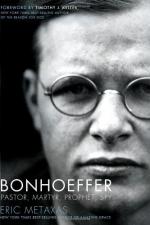|
This section contains 627 words (approx. 2 pages at 400 words per page) |

|
Bonhoeffer: Pastor, Martyr, Prophet, Spy Summary & Study Guide Description
Bonhoeffer: Pastor, Martyr, Prophet, Spy Summary & Study Guide includes comprehensive information and analysis to help you understand the book. This study guide contains the following sections:
This detailed literature summary also contains Topics for Discussion and a Free Quiz on Bonhoeffer: Pastor, Martyr, Prophet, Spy by Eric Metaxas.
This biography of German theologian Dietrich Bonhoeffer, martyred by Adolf Hitler at the end of World War II, draws substantially on Bonhoeffer's own writings as it chronicles the development of his Christian faith and how a determination to live according to that faith led him into a conspiracy to kill Hitler. At the same time as it focuses on Bonhoeffer's determination to understand and live God's will, the narrative also explores themes related to the nature and value of loyalty, and the value of both friendship and family.
In a prologue, the author describes a church service in London, held just as World War II was ending, that memorialized Dietrich Bonhoeffer, executed for what was called treason but what his family, friends and allies came to believe an act of faith. The prologue concludes with a brief description of how Bonhoeffer's parents, Karl (an eminent psychologist) and Paula (a well-born mother of eight) learned of their youngest son's death for the first time while listening to that broadcast.
The narrative then shifts to the past and the author's detailed examination of the emotionally reserved, intellectually challenging, theologically sparse childhood that was the foundation for the adult Bonhoeffer's quest for full, lived understanding of God's will, and for the courage and grace to put that will into action. After completing his elementary and senior education in Berlin, and after completing a theological degree in university, Bonhoeffer traveled to Spain, to Italy, to England and to America. In each of these countries, he deepened his perspective on, and insight into, what was becoming a very conservative, traditional, Bible-based theology. Meanwhile, the author is also outlining the causes, circumstances and manifestations of the rise to power of German Chancellor (then President, then Fuhrer) Adolf Hitler, and the associated rise of anti-Jewish, anti-minority sentiment and activity in 1930's Germany.
When Bonhoeffer finally settled in Berlin in the mid-to-late 1930's, Hitler's rise to power was almost complete, and almost entirely unopposed by the majority of the German population. Bonhoeffer's family, friends and colleagues, however, many of whom were highly placed within the ranks of Hitler's Third Reich, kept each other informed of the increasingly frequent, and increasingly inhumane, crimes against humanity being perpetrated by Hitler and his minions, all in the name of re-establishing German pride of place in Europe. Bonhoeffer's efforts focused on strengthening the so-called Confessing Church, a determinedly pro-Christian community of believers established in opposition to the Reich Church, which was only nominally Christian in its unwavering, propagandistic devotion to the word and ways of Hitler.
Eventually, as Hitler's greed for power led him and Germany into invasions of Czechoslovakia, Poland, France and what was then Russia, Bonhoeffer, like-minded members of his family, and allies in the cause of the Confessing Church joined into a conspiracy to assassinate Hitler. Bonhoeffer, the author reveals, believed that in taking action to rid the world of a being (Hitler) and a government (the Third Reich) that was so anti-Christian, he was in fact acting on God's will for him. Several attempts to kill Hitler fell short of their ultimate goal, with one of them (the Valkyrie Plot) coming closest but ultimately failing. As the result of Valkyrie's failure, Bonhoeffer and many of his fellow conspirators were arrested, imprisoned, and ultimately executed.
The narrative draws to a close with the author's return to the scene he described in the Prologue - the British memorial service. He incorporates several texts from the service, including the sermon given by one of Bonhoeffer's closest friends and colleagues. The book concludes with one final reference to Bonhoeffer's parents, whose lives had inspired and encouraged their son in so many ways and who, at the end of the service, simply turned off the radio.
Read more from the Study Guide
|
This section contains 627 words (approx. 2 pages at 400 words per page) |

|



